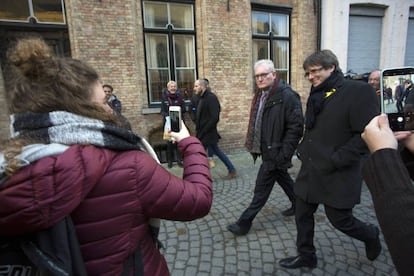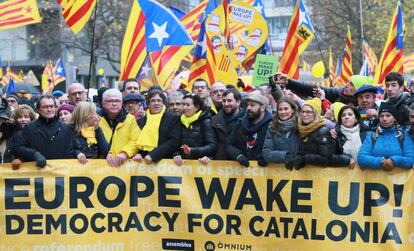Carles Puigdemont’s life in his Belgian refuge
Ousted Catalan premier and former ministers, who fled to Brussels, are being protected by local authorities and a small group of aides


Josep Maria Matamala never leaves Carles Puigdemont’s side. Jami, as he is known to friends, is a businessman and a founding member of the Girona branch of Democratic Convergence of Catalonia (CDC, one half of the CiU federation that ruled Catalonia for decades until its breakup over the independence issue).
He is also a close friend of the ousted Catalan premier who dropped everything he was doing in order to be with Puigdemont in what both men consider to be a state of exile. With his imposing build and taciturn personality, Matamala is like Puigdemont’s shadow: he is always a few steps ahead of his friend, quietly coordinating the latter’s movements in Belgium and keeping a close eye on his surroundings.
On November 2, at the precise time when Spain’s High Court, the Audiencia Nacional, had summoned Puigdemont for a hearing over his role in the independence drive, the Catalan politician was sitting inside a café near the European Parliament, having a private conversation with Matamala.
In the six weeks that he has been in Belgium, Puigdemont has not once been inside European Commission or European Parliament buildings
Matamala is one of the few people allowed inside Puigdemont’s inner circle. The communications service of the self-denominated “Office of the Legitimate Government of Catalonia” keeps a selection of media outlets informed about Puigdemont’s public events. EL PAÍS is not one of them.
Ramon Tremosa, an MEP for the European Democratic Party of Catalonia (PDeCAT, the new name for CDC) and one of the people who is closest to Puigdemont in Belgium, says that there is a lot of concern about his safety. “Concern about his physical and legal safety,” specifies Tremosa’s assistant, Aleix Sarri. Puigdemont says he has been harassed by television reporters from Spain’s private network La Sexta. And on November 14, Antena 3 sent journalists on a search of the Belgian commune of Uccle after getting wind that the Catalan politician was hiding out there.
There are constant leaks regarding Puigdemont’s alleged whereabouts. After living like nomads for a few weeks, he and the four regional ministers who fled with him have settled down in separate residences. The only official information regarding their locations is the fact that former health chief Toni Comín lives in Leuven and that he goes for regular strolls in the city center, as three Catalan social education students who are currently living there recently confirmed inside a bar called Fiere Margriet: “We’ve had our picture taken with him and we greet him if we see him on the street.”

Any public appearances by Puigdemont, Comín, Clara Ponsatí, Meritxell Serret or Lluís Puig always take place in different locations and are announced on very short notice. So it was with the news conference last Wednesday to discuss the Spanish Supreme Court’s decision to withdraw the European arrest warrant against them.
Later that day, inside the same venue – Hotel President Park in Brussels – there was a political rally by Junts Per Catalunya, the separatist platform headed by Puigdemont that is running in the December 21 elections in Catalonia. The rally was attended by supporters who had arrived in Belgium from Catalonia to attend the Thursday demonstration in Brussels’ European neighborhood.
Wednesday was a good example of how misinformation is used to avoid unwanted media attention: following the news conference at President Park, Puigdemont’s aides assured EL PAÍS that they still didn’t know the venue for the afternoon event, even though it took place inside the same hotel and included a fundraising dinner. One attendant said that he paid €500 to share a table with Puigdemont and Mas.
There are constant leaks regarding Puigdemont’s alleged whereabouts
At all times, Puigdemont was protected by Matamala and by several members of the Catalan police, the Mossos d’Esquadra, who are officially on vacation in Belgium. One of these officers is Lluís Escola Miquel, who helped the ousted premier get out of Spain following the central government’s application of Article 155, which involved sacking the entire regional government and calling early elections to find a new, law-abiding set of officials.
Another key individual is Joan Maria Piqué, Puigdemont’s communications coordinator. Piqué was previously the press chief for former Catalan premier Artur Mas, and became known for coming down hard on the media. Sources at PDeCAT said that Piqué is back on the front lines: “The initial stages of their stay in Belgium were chaos, and somebody was needed to come in here and put things in order.”
Puigdemont and his ministers’ personal security is being handled by the Belgian Interior Ministry’s Crisis Center. Local officers are routinely dispatched to watch over Puigdemont’s public appearances. A center spokesman said that his agency is in charge of “guaranteeing the safety of 3,000 foreign dignitaries annually.” This center “is also responsible for coordinating security measures for Mr Puigdemont and the other members of the Catalan government.”
A key political support is the nationalist party New Flemish Alliance (N-VA), whose president, Bart De Wever, is the mayor of Antwerp. In November, De Wever published an English-language essay about the evolution of Flemish nationalism that was filled with comparisons with the history of Catalan nationalism. The N-VA says that “events in Catalonia have placed self-determination and nationalism on the front lines of the political debate.”
Mark Demesmaeker is an MEP for the N-VA and one of the Flemish nationalist leaders who has been in closest contact with Puigdemont. His office inside the European Parliament is decorated with posters supporting the release of separatist leaders, a flag of the Basque Country, a portrait of Irish nationalist hero Michael Collins, and Tibetan flags.
“We the Flemish sympathize with the oppressed because for centuries we ourselves have been an occupied nation,” he said.
Demesmaeker confirmed that his party is providing logistical and organizational support to Puigdemont’s team when required. Demesmaeker and Tremosa are among a group of around 26 MEPs who support the Catalan politician and who had lunch with him recently at Hotel Leopold.
But the N-VA denies making any contributions, either in the form of cash, housing or transportation, to the Catalan group. Details about who is financing the latter’s stay in Belgium remain a mystery.
“Cabinet” meetings
Every Tuesday, the group holds a “legitimate government” cabinet meeting in a secret location. The rest of the time, they keep busy with activities relating to their former positions: Comín, the former health chief, has met with the medical union Médicos de Cataluña; Serret, who headed the agriculture department, has visited the Agribex fair.
Puigdemont has also met with several media outlets and groups at Hotel Vintage in Brussels, and at Tervueren Park.
People who are familiar with the Catalan politicians’ routines said that outside of Brussels, they tend to stay within Flemish territory “because they are in sync with Flemish society.” While Demersmaeker agreed that there might be more sympathy for Puigdemont in Flanders, “Belgians as a whole believe that (Spain) wants to imprison them for their ideas, and this kind of thing cannot take place in Europe.”
Yet in the six weeks that he has been in Belgium, Puigdemont has not once been inside European Commission or European Parliament buildings, reflecting EU institutions’ rejection of unilateral secession. But the European Parliament is considered international territory outside Belgian jurisdiction, and now that the European arrest warrant has been lifted, Puigdemont may try to take his crusade within the walls of the EU’s legislative body.
English version by Susana Urra.
Tu suscripción se está usando en otro dispositivo
¿Quieres añadir otro usuario a tu suscripción?
Si continúas leyendo en este dispositivo, no se podrá leer en el otro.
FlechaTu suscripción se está usando en otro dispositivo y solo puedes acceder a EL PAÍS desde un dispositivo a la vez.
Si quieres compartir tu cuenta, cambia tu suscripción a la modalidad Premium, así podrás añadir otro usuario. Cada uno accederá con su propia cuenta de email, lo que os permitirá personalizar vuestra experiencia en EL PAÍS.
¿Tienes una suscripción de empresa? Accede aquí para contratar más cuentas.
En el caso de no saber quién está usando tu cuenta, te recomendamos cambiar tu contraseña aquí.
Si decides continuar compartiendo tu cuenta, este mensaje se mostrará en tu dispositivo y en el de la otra persona que está usando tu cuenta de forma indefinida, afectando a tu experiencia de lectura. Puedes consultar aquí los términos y condiciones de la suscripción digital.








































